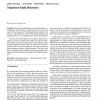Free Online Productivity Tools
i2Speak
i2Symbol
i2OCR
iTex2Img
iWeb2Print
iWeb2Shot
i2Type
iPdf2Split
iPdf2Merge
i2Bopomofo
i2Arabic
i2Style
i2Image
i2PDF
iLatex2Rtf
Sci2ools
110
click to vote
WDAG
1998
Springer
1998
Springer
Transient Fault Detectors
We present fault detectors for transient faults, (i.e. corruptions of the memory of the processors, but not of the code of the processors). We distinguish fault detectors for tasks (i.e. the problem to solve) from failure detectors for implementations (i.e. the algorithm that solves the problem). The aim of our fault detectors is to detect a memory corruption as soon as possible. We study the amount of memory needed by the fault detectors for some specific tasks, and give bounds for each task. The amount of memory is related to the size and the number of views that a processor has to maintain to ensure a quick detection. This work may give the implementation designer hints concerning the techniques and resources that are required for implementing a task. Keywords Distributed Systems
Related Content
| Added | 06 Aug 2010 |
| Updated | 06 Aug 2010 |
| Type | Conference |
| Year | 1998 |
| Where | WDAG |
| Authors | Joffroy Beauquier, Sylvie Delaët, Shlomi Dolev, Sébastien Tixeuil |
Comments (0)

